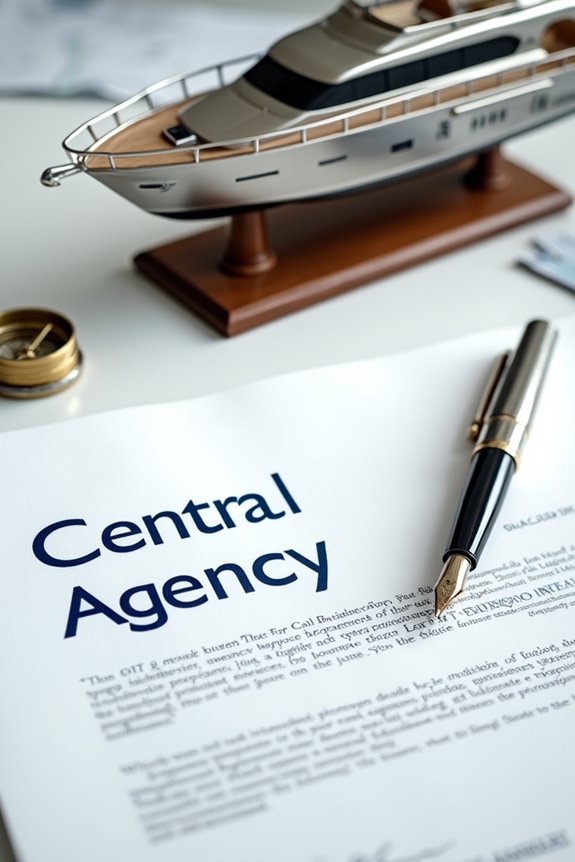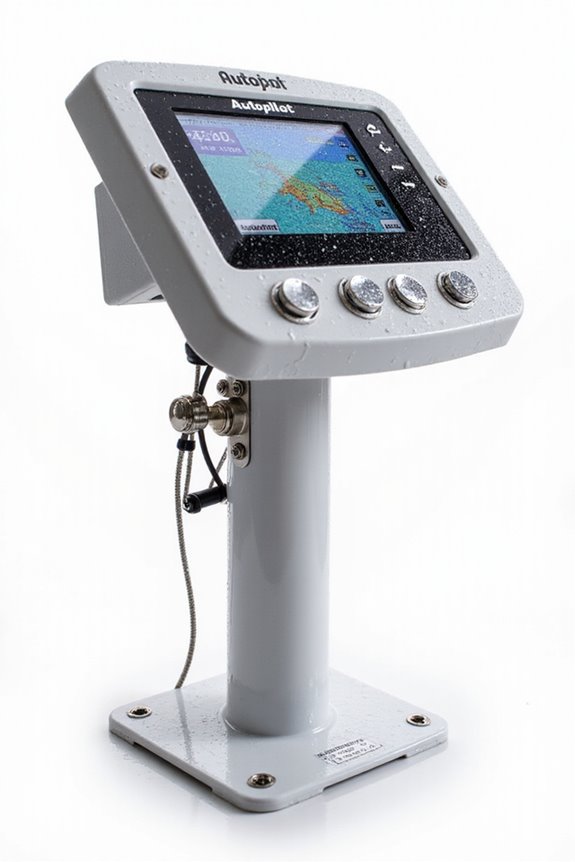Let’s simplify central agency agreements in yachting: they’re exclusive deals where one broker takes charge of selling your yacht, handling marketing, negotiations, and often sharing commissions with co-brokers. This lets yacht owners enjoy expert service without juggling multiple agents. The broker keeps everything organized, from calendar to contracts, making life easier for everyone involved. Curious about how commissions work or what makes a good central agent? Stick around, we’ve got you covered.
Key Takeaways
- Central agency agreements grant exclusive rights to one broker to sell or manage a yacht within a defined period and territory.
- Central agents handle marketing, negotiations, calendar coordination, and financial management for yacht sales and charters.
- Brokers typically earn fixed commissions (around 10% for sales, 20-30% for charters), often shared in co-brokerage arrangements.
- Clear contracts outline roles, exclusivity, commissions, and legal terms to prevent disputes and ensure smooth collaboration.
- Effective communication and trust-building between owners and agents are critical for successful yacht sales and charter operations.
Definition and Purpose of Central Agency Agreements
Let’s explore what a central agency agreement really means, especially if you’ve ever wondered how yacht sales actually work behind the scenes. In yacht sales, a central agency is an exclusive listing arrangement where the yacht owner hires one broker to handle the sale. This means the owner agrees to sell the yacht only through that agent, who then manages marketing, evaluation, and negotiations with buyers. Pretty straightforward, right? What’s cool is that these agents often team up with other brokers, sharing commissions if someone else finds the buyer. This boosts exposure and speeds up sales, making life easier for owners who want expert help without juggling all the details. So, central agency is kind of like having a trusted captain steering the yacht sale for you—smooth sailing ahead!
Key Features of Exclusivity in Yacht Sales
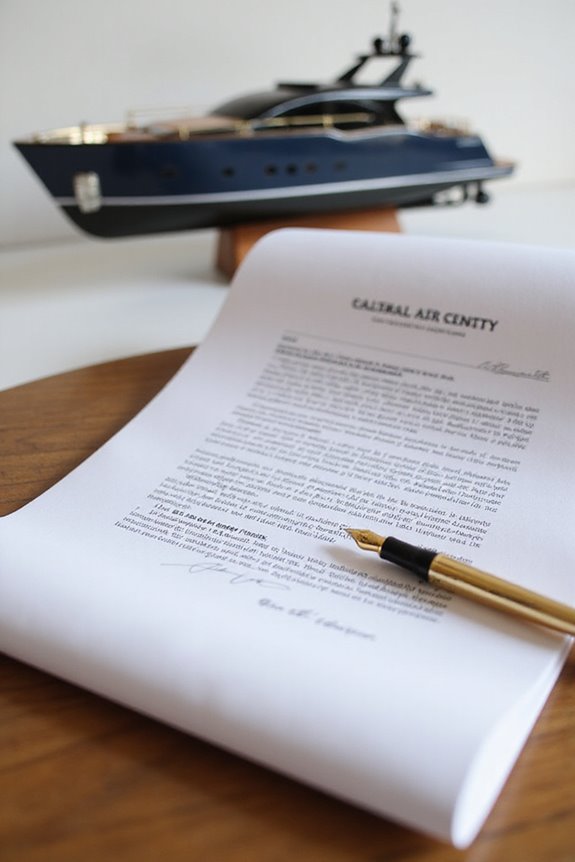
A few key features really set exclusivity clauses apart in yacht sales, and understanding them can save you a lot of headaches down the road. First, there’s the exclusivity duration — the set period when the central agent alone can sell your yacht. It’s like giving them the captain’s chair temporarily, steering the sale without interference. Alongside this, territorial rights define where this exclusivity applies, whether it’s global or just within certain waters. These rights guarantee no other agent can sneak in and claim your sale within the agreed zone. Together, they protect both seller and agent by clarifying who’s in charge, where, and for how long. It’s crucial to nail down these terms to avoid the dreaded “who sold it?” disputes later on.
Roles and Responsibilities of Central Agents
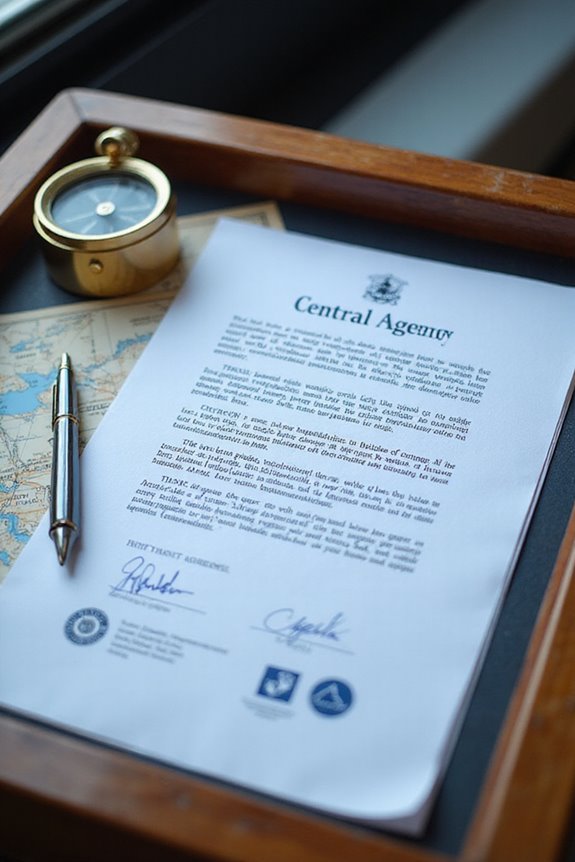
Although it might seem like central agents simply act as middlemen, their roles go way beyond that—they’re the essential gears that keep yacht charter operations running smoothly. In charter management, these agents juggle everything from calendar coordination to handling contracts, making certain every trip is perfectly planned. But it’s not just about schedules—they’re also the key players in client relations, smoothing communications between yacht owners and charter guests. Think of them as the friendly translators who keep everyone on the same page, avoiding missteps. They manage finances, guarantee compliance with tricky regulations, and provide owners with clear reports. Without central agents working behind the scenes, the whole charter experience could quickly become a sinking ship, so we owe a bit of thanks for keeping things afloat, don’t we?
Marketing Strategies Employed by Central Brokers

Since marketing yachts isn’t just about listing photos online, we need to understand the clever strategies central brokers use to get these luxury vessels noticed—and, more importantly, sold. These marketing techniques go beyond digital ads; they include networking at boat shows and luxury events where client engagement happens face-to-face. Ever wonder how brokers find the right buyers? It’s through industry connections, traditional media ads, and targeted social campaigns that boost visibility online. Plus, analyzing market trends lets brokers know when—and how—to pitch yachts to attract genuine interest. So, marketing in yachting is a blend of savvy communication, timely insights, and building relationships that make clients feel like part of an exclusive club, all while steering sales toward smoother waters.
Negotiation and Contract Management Processes
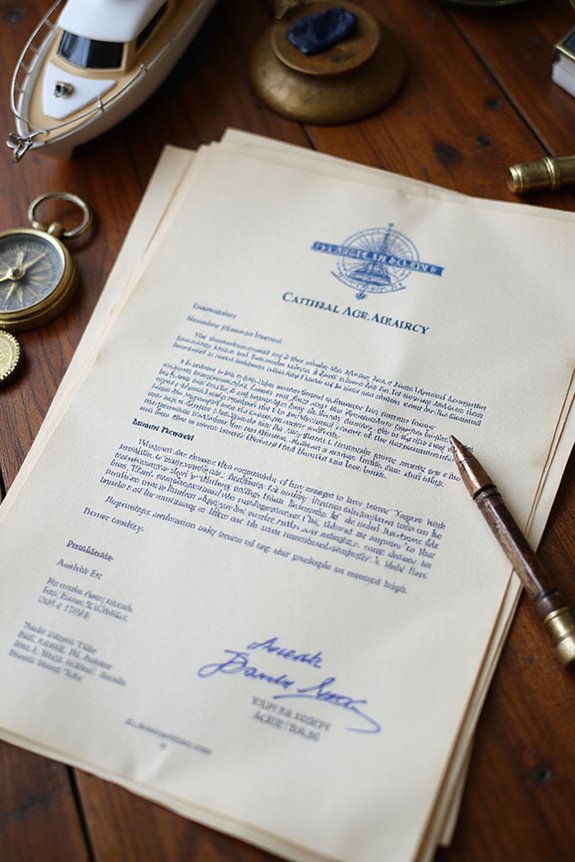
Now that we’ve seen how central brokers get yachts noticed through savvy marketing, let’s chat about what happens when it’s time to turn interest into a sale. Negotiation tactics here are all about clear communication and finding common ground. We restate offers, counter thoughtfully, and keep everyone in the loop—because nobody likes surprises, right? Contract clarity is just as important; it guarantees we all understand commission splits, exclusivity terms, and responsibilities. Managing multiple brokers means coordinating who does what and who earns what, avoiding any “he said, she said” moments. Plus, well-documented agreements keep everything transparent and smooth, helping us guide buyers and sellers through sea trials and paperwork with confidence. It’s teamwork, clear terms, and smart negotiation—making yacht deals sail effortlessly.
Legal Considerations and Contractual Obligations
When we plunge into legal considerations and contractual obligations, it’s easy to feel like you’re swimming through a sea of paperwork and fine print. But don’t worry—having contractual clarity is our lifesaver. To keep everyone on the same page, contracts must detail yacht specs, charter dates, and itineraries, ensuring no surprises later. We also lean on industry-standard MYBA agreements, which help guarantee legal compliance and authenticity. Ever wonder about crew management or dispute resolution? These are key clauses that protect both owners and clients. Plus, central agents need proper authority from yacht owners and must keep all documents shipshape—accurate and updated, naturally. Staying aligned with laws where the yacht is flagged or chartered isn’t just smart—it’s essential. So, while the legal sea may be vast, sticking to standards keeps us afloat together.
Commission Structures and Co-brokerage Arrangements
Legal details and contracts lay the groundwork, but what about the money side of things? When it comes to commission rates, yacht brokers usually earn a 10% commission under a central agency agreement, which secures exclusivity. But here’s the twist: when co-brokerage comes into play—which is about 70% of the time—brokerage fees get split, often right down the middle between the central agent and the cooperating broker. This teamwork expands market reach, boosting chances of a sale, and the commission structures tend to be clear and fixed, with few surprises. Yacht charter commissions usually hover between 20% and 30%, divided carefully. So, co-brokerage isn’t just a fancy industry term—it’s a real-life collaboration benefiting everyone involved, including you, whether buying or selling.
Criteria for Selecting the Right Central Agent
Choosing the right central agent can feel like picking a captain for your yacht’s success — it’s a big decision, and you want someone who knows the waters well. So, where do we start the selection process? First, we look at agent qualifications like professional licenses, memberships in groups such as MYBA, and proven experience in yachting. We want an agent who embraces ethical standards and has a strong reputation—after all, trust is everything in this community. Don’t forget operational savvy: a great agent uses smart technology, communicates clearly, and offers solid support. Plus, financial know-how is essential, from handling contracts to managing funds smoothly. By focusing on these criteria, we can feel confident that the agent we choose really fits our shared goals. Sound like a plan?
Advantages of Central Agency Agreements for Owners and Brokers
Now that we’ve figured out what makes a good central agent, let’s look at why central agency agreements are a win-win for both owners and brokers. For owners, central agent benefits include exclusive control over marketing and sales, ensuring privacy and streamlined communication—no more confusing multiple offers flying around. Plus, owners enjoy expert handling of pricing and compliance, making the whole process smoother. On the broker side, these agreements encourage smart broker strategies like sharing commissions to motivate collaboration, creating a team effort instead of competition. Brokers also like the exclusivity—it secures their commission, even if the owner finds the buyer independently. So, what’s not to like? Central agency agreements neatly tie everyone together, making yacht sales both efficient and fair. Isn’t that a relief?
Common Challenges and How to Address Them
Tackling the common challenges in central agency agreements isn’t exactly a walk in the park, but it’s far from impossible — and we’re here to make it clearer. One big hurdle is breaking down communication barriers; without clear, regular updates, misunderstandings can sink the best marketing efforts. Trust building is equally essential—owners won’t share critical details without feeling confident in their agents. Then there’s legal fine print and financial bumps, like aligning sales strategies and managing commissions, which demand teamwork and sharp contracts. How do we address these? Open dialogue, precise contracts, and involving experts when needed create a strong foundation. Together, we can navigate these waves smoothly, ensuring each party feels confident and included—because in yachting, it’s all about collaboration and clear communication.
Frequently Asked Questions
How Does a Central Agency Agreement Affect Yacht Insurance During the Sales Period?
It is understood that insurance coverage during the sales process stays protected because a central agency guarantees only authorized agents handle showings, reducing risks and clarifying liabilities, so we all feel confident and secure throughout the yacht’s sale journey.
Can Central Agency Agreements Be Transferred if the Owner Changes Brokers?
Did you know 70% of yacht owners face challenges shifting broker loyalty? We must carefully review contract terms, as transferring central agency agreements often needs owner consent and clear termination, fostering trust within our close-knit yachting community.
What Happens to the Agreement if the Yacht Is Substantially Upgraded Mid-Contract?
When a yacht’s substantially upgraded mid-contract, we usually need contract modifications to reflect the new yacht valuation. Let’s keep transparency, ensuring both broker and owner benefit fairly, fostering trust and a strong partnership throughout the process.
Are There Tax Implications Specific to Sales Under Central Agency Agreements?
Did you know VAT on yacht sales varies by jurisdiction, affecting tax liabilities considerably? Together, we must consider sales commissions and local tax rules carefully to avoid surprises and guarantee our Central Agency Agreement works smoothly for everyone involved.
How Are Disputes Between Co-Brokers Typically Resolved in Practice?
We understand disputes in co-broker agreements often arise, so we rely on dispute resolution methods like binding arbitration or mediation. These guarantee fair outcomes, protect our relationships, and keep us all connected in the yachting community.

